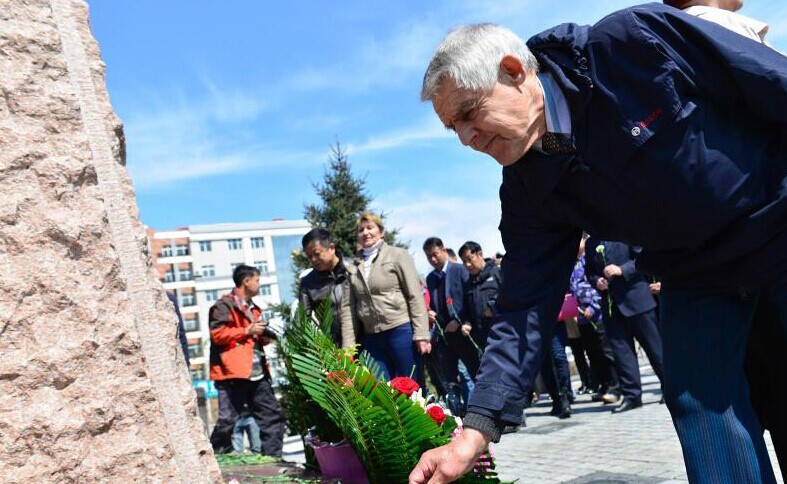Defending history is to defend peace

Xinhua
This year is the 100th anniversary of World War I and the 75th anniversary of World War II, two events that left incomparable scars on the world. On July 26, the international academic symposium titled "World War I and World War II in Retrospect: Lessons and Inspirations" was convened in Beijing, co-hosted by the Chinese Academy of Social Sciences (CASS) and the Academy of Military Sciences of the Chinese People's Liberation Army (PLA). The symposium drew more than 200 scholars from China, Russia, France, the United States, Japan, Sierra Leone and other countries.
Deputy Director of the State Council Information Office of China Cui Yuying, Vice-President of CASS Li Peilin and Vice-President of the Academy of Military Sciences of PLA He Lei attended and addressed the symposium.
Wu Yin, the former vice-president of CASS, Qu Aiguo, director of the Department of Military History and Encyclopedic Information Research at the Academy of Military Sciences of PLA, and Professor Lyubodrage·Dimić from the Serbian Academy of Sciences and Arts delivered the keynote speech.
Contention for hegemony, root cause of wars
"The lessons taught by the two World Wars are harsh but profound," Vice President of CASS Li Peilin remarked. Li said all nations must realize that the root cause of the conflicts was the extended rule of an unfair and unreasonable international system that was born of the imperialist countries' desire for colonial expansion and contention for hegemony.
Professor Nakayama from the Toshio Clausewitz society of Japan, echoed Li's sentiments, saying that the imbalance of capitalist development gave rise to rivalries and alliances between imperialist powers, prompting the outbreak of the two World Wars.
Nicholas Spencer, from Sierra Leone University, said that international relations should not rely on wars as a means of conflict resolution because the expense is huge for the defeated country as well as the victors.
Right-wing in Japan continues denying history
Kurosawa Fumitaka from the Tokyo Women's Christian University compared today's Japan with the nation as it was in the era between the two World Wars. As to what the social order should be like, there is a lack of consensus among Japanese politicians, intellectuals and citizens. This incoherent view enables the distortion of history by right-wing forces. Right-wing forces not only continue to deny Japan's history of belligerence, but also sound an alarm about the so-called China threat. Since the start of 2014, Shinzou Abe has made multiple statements that history is repeating itself, alluding China like Germany which defied the Vienna System prior to World War I.
It is a "perversion of the truth", said Lü Jie, a professor from the Army Academy of the PLA. Throughout the modern world history, Japan had always been the place where Asian wars have originated. With Abe’s return to power, its ambitions are growing once again, Lü said.
"What Abe is doing is propelling Japan onto the track of damaging national peace, which clearly goes against the social tides of justice," Nakayama added.
China as a mainstay of anti-fascist forces
"We gather here to study and reflect on the World Wars for the purpose of preventing the recurrence of wars and safeguarding world peace," said Zhang Shunhong, director of the Institute of World History at CASS.
China was one of the major anti-fascist forces during World War II. Chinese battlefields, as one of the major fronts of the anti-fascist war, helped contained two-thirds of the Japanese army. The anti-Japanese war started in as early as the year 1937 and lasted eight years. During this period, 35 million people lost their lives in addition to the countless wounded. Given such a complex international context, Li Peilin recommended each country should seek to establish a fair and justified international order and actively participate in global governance in conformity with the principle of equal sovereignty, common security and mutual inclusiveness.
Nakayama expressed his confidence in China, who persues world peace by following the Five Principles of Peaceful Co-existence. He said it is impossible for China to trigger world wars like what Germany or Japan did in the past.
An associate research fellow from the Academy of Military Sciences of PLA said China’s proposal of the new security concept and a new type of relations between great powers shows the foresight of Chinese leaders, who have reexamined the two World Wars with great profundity. "If such concepts, which are in line with the evolutionary law of human civilization and the world trends, could gain more recognition from other countries, we will live in a world that is definitely more peaceful and secure," he said.
The Chinese version appeared in Chinese Social Sciences Today, No. 626, July 28, 2014
The Chinese link is:
http://www.cssn.cn/sjs/sjs_xsdt/201407/t20140728_1269391.shtml
Translated by Bai Le
